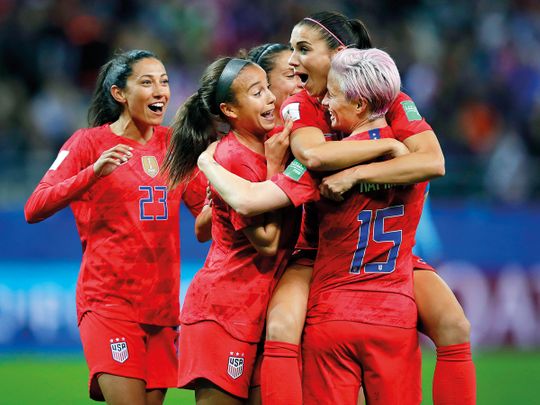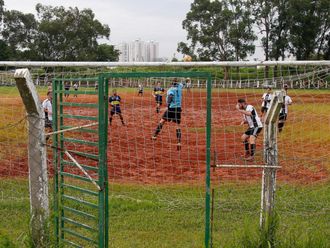
Reims: It was the most one-sided game in World Cup history. And it wasn’t that close.
The US women’s 13-0 rout of Thailand in their tournament opener on Tuesday was a rout wrapped in a mauling inside an embarrassment. And with Alex Morgan scoring five times, it was a game that featured almost as many records as it did goals:
— The 13 goals were the most in a World Cup game, regardless of gender, and the margin of victory was also the largest ever, surpassing Germany’s 11-0 win over Argentina in the Women’s Cup opener in 2011. It was also more than the US men’s team has scored in the last four World Cup tournaments combined.
— Morgan’s five goals matches the World Cup record set by Michelle Akers in 1991 and tied by Russia’s Oleg Salenko in the men’s tournament in 1994. And she could have had more, missing out on a goal in the fifth minute to an offside call that was so close it took a video replay to confirm.
— With Rose Lavelle and Samantha Mewis supporting Morgan with two goals apiece, it was the first time a team has had three players score more than one goal in a Women’s World Cup game. And the seven scorers overall tied a record.
“It’s how you want to start a tournament,” coach Jill Ellis said. “You want to have that feeling. It is about building momentum. It is about that first game under your belt. That feeling, that’s the biggest takeaway for us.”
Others came away with a different feeling. Because with the US scoring six of their goals — including three by Morgan — in the final 16 minutes, the Americans found themselves answering almost as many questions about running up the score and they did about the score itself.
“I’ll be honest. I sit here and I go, ‘If this had been 10-0 in a men’s World Cup, would we be getting the same questions?’” Ellis said. “A World Cup, it is about competing. It is about peaking.”
None of those complaints came from the Thai side.
“We accept the score,” Thailand coach Nuengruethai Srathongvian said. “We haven’t done enough. In a football game, everybody is following the rules. We don’t have any excuse.”
The game was the last of 12 group-play openers. And with France, Brazil and Spain all posting impressive wins in their first games, the defending champions admitted there was some pressure to put up a marker of their own.
“We wanted to make a statement,” said midfielder Julie Ertz, who started at centre-back in place of the injured Becky Sauerbrunn. “We wanted to kind of show all the tools we have.”
But this game was a mismatch long before the team buses arrived. Because for all the talk about growing parity in women’s football and the narrowing of the gap between the top teams and rest of the field, a lack of funding and institutional support at home has turned that gap into a chasm for countries such as Thailand.
The Thais, for example, have one Women’s World Cup win in their history; the US has won three World Cup titles. Thailand has lost 12 of their last 13 games dating back 10 months; the US have lost once in 39 games dating back nearly 22 months.
“We’re a developing programme. We all know that,” said Thai forward Miranda Nild.











